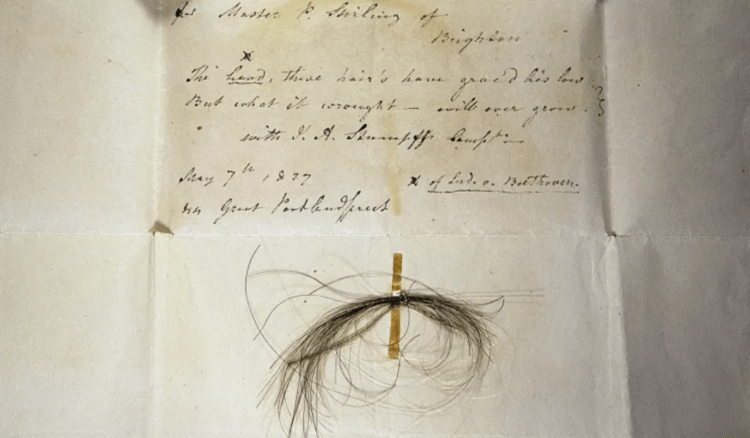Ludwig van Beethoven is one of the greatest composers of the 18th-19th centuries. However, he is famous not only for his works such as “Moonlight Sonata”, “Für Elise” or “Symphony No. 5”, but also for the fact that by the age of 48 he became completely deaf and continued to compose music while deaf. Moreover, he began to lose his hearing at the age of 27. The reasons were not known, so different versions were given. According to one of the main ones, which was confirmed by some studies, the composer suffered an infection – he fell ill with typhus, which deprived him of his hearing. However, a recent study of Beethoven's DNA showed that the cause of his deafness could have been different, or at least not solely due to infection.

Scientists have explained why Beethoven could have lost his hearing
Was Beethoven poisoned?
Recently, thanks to Through DNA analysis, scientists were able to learn many new facts about Beethoven. For example, they discovered that the composer had a genetic predisposition to deafness. But he, on the contrary, did not have a genetic predisposition to musical abilities.
The new study, like many previous ones, is based on the study of strands of Beethoven's hair. Scientists have found that they contain high concentrations of lead, arsenic and mercury. The authors report this in the journal Clinical Chemistry. For example, one strand contains 380 micrograms of lead per gram of hair. In the second strand, scientists found 258 micrograms of this toxic metal.
This is significantly higher than the normal level, which is less than four micrograms. The arsenic content, as reported by the authors, is 13 times higher than the norm, and the mercury content is 4 times higher than the norm. Researchers say Beethoven had the highest levels of toxic substances in his hair that they have ever seen, and they receive hair samples from all over the world for the study.

Scientists examined a strand of Beethoven's hair. Photo source: www.forbes.ru[/caption
Why Beethoven lost his hearing
As the researchers report in their work, lead could not have been the direct cause of the death of the German composer. Although its content in hair is very high, it is not enough to kill a person. However, the toxic metal may have contributed to the diseases that Beethoven suffered from during his life, which have been confirmed by other studies. These include gastrointestinal problems, liver disease, and hearing loss. It is quite possible that the cause of deafness was two factors at once – lead poisoning and an infection.
As for liver disease, it was the cause of Beethoven’s death. According to Science Alert, the composer suffered at least two episodes of jaundice, which is a symptom of serious liver disease. The study also showed that the composer was infected with hepatitis B. However, the study does not say anything about how high levels of arsenic and mercury affected health, but they certainly did not improve health.
 Lead could have entered Beethoven's body with wine
Lead could have entered Beethoven's body with wine
Why Beethoven was poisoned by lead
Where did the lead in Beethoven's hair come from? There is no exact answer to this question. However, many scientists believe that the composer’s addiction to wine is to blame. Beethoven often drank an entire bottle in a day. At that time, wine producers practiced adding lead acetate to its composition as a preservative and sweetener. In addition, lead was also contained in glass bottles that served as containers for wine.
If scientists are not mistaken, that is, hearing loss is really associated with lead, which entered the body with wine, it can be assumed that Beethoven became addicted to wine at a fairly early age. As mentioned above, he began to notice hearing loss at the age of 27 years. The situation worsened over the course of 20 years until it turned into complete deafness.

Beethoven continued to compose music even after he lost his hearing
As for the source of arsenic and mercury, most likely he was different. Beethoven was a lover of fish caught in the Danube. It contained large amounts of these metals, as reported by CNN. As a result, arsenic and mercury accumulated in his body.
Don't forget to subscribe to our Zen and Telegram channels so you don't miss the most interesting and incredible scientific discoveries!
Finally, we note that scientists were able to obtain all this information due to the fact that previously people often kept strands of hair from loved ones or celebrities as souvenirs. Now modern technologies make it possible to learn many nuances of a person’s life from this hair. According to the authors, their research is an important piece of a complex puzzle that will help historians, doctors and scientists understand the composer's medical history and the cause of his death. We have already talked about some of its facts earlier.